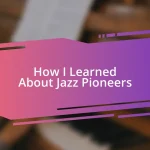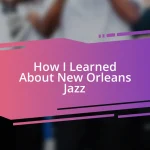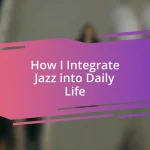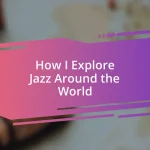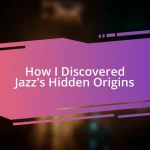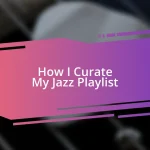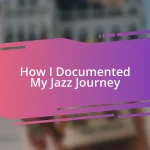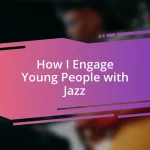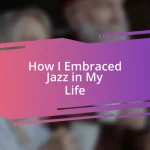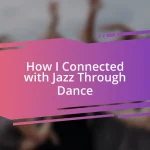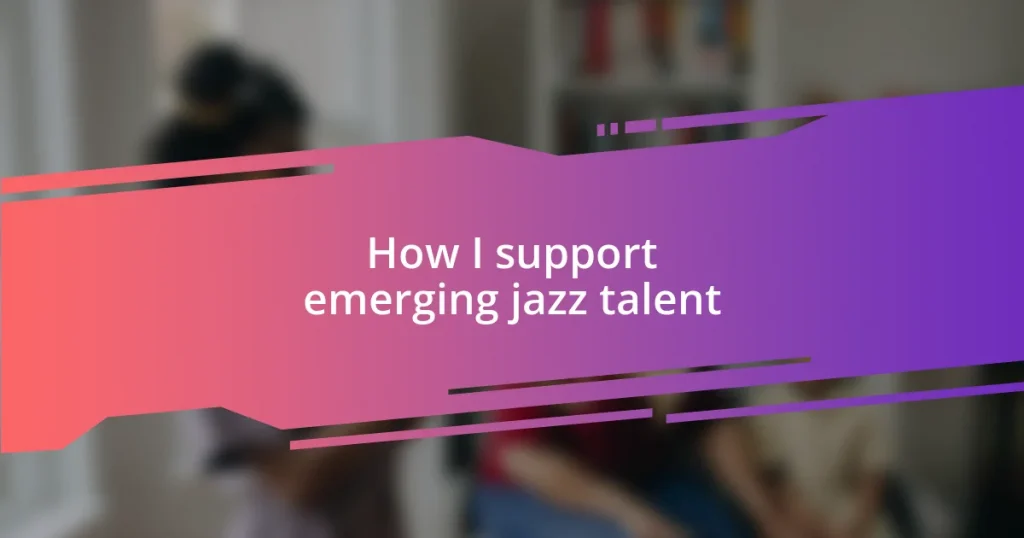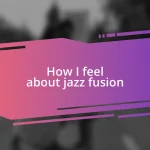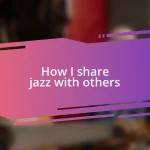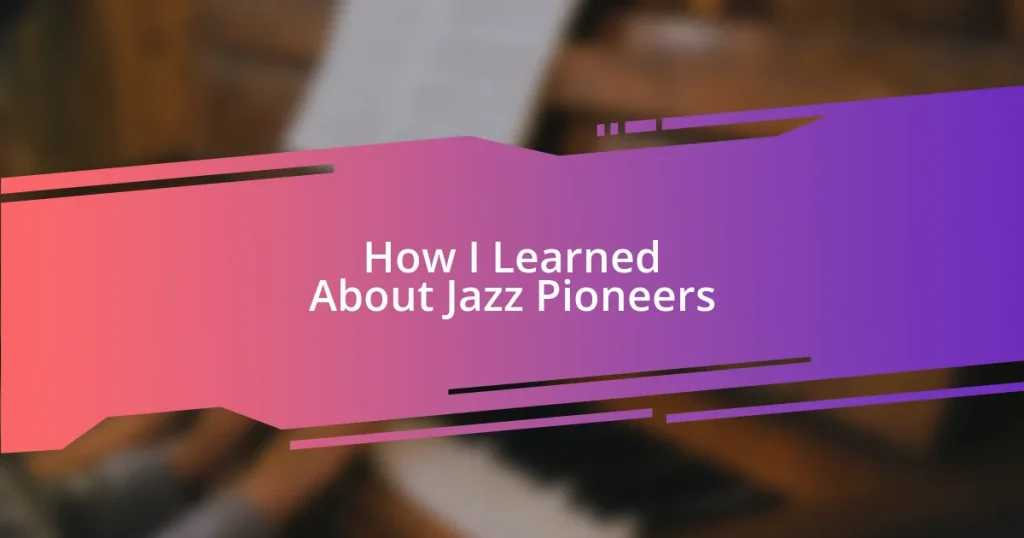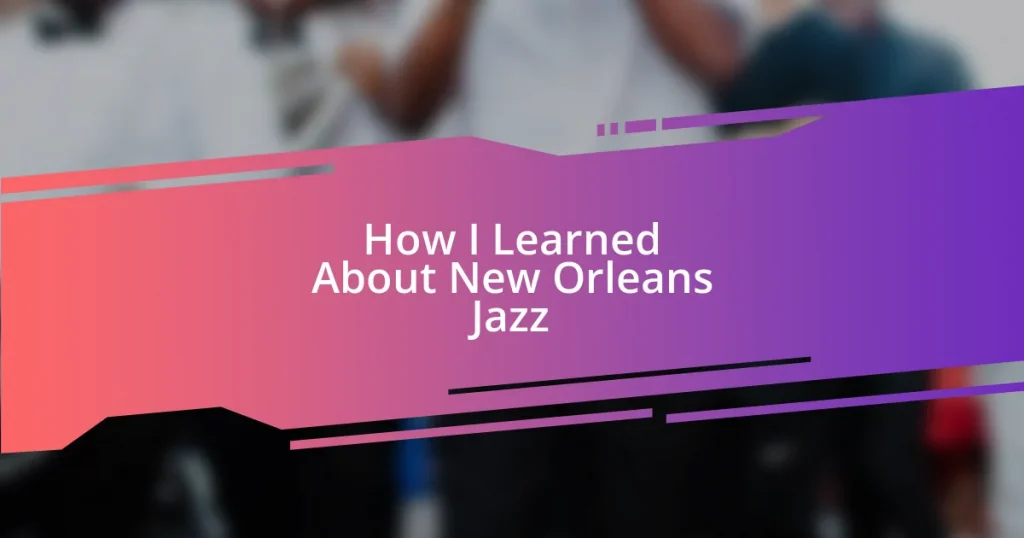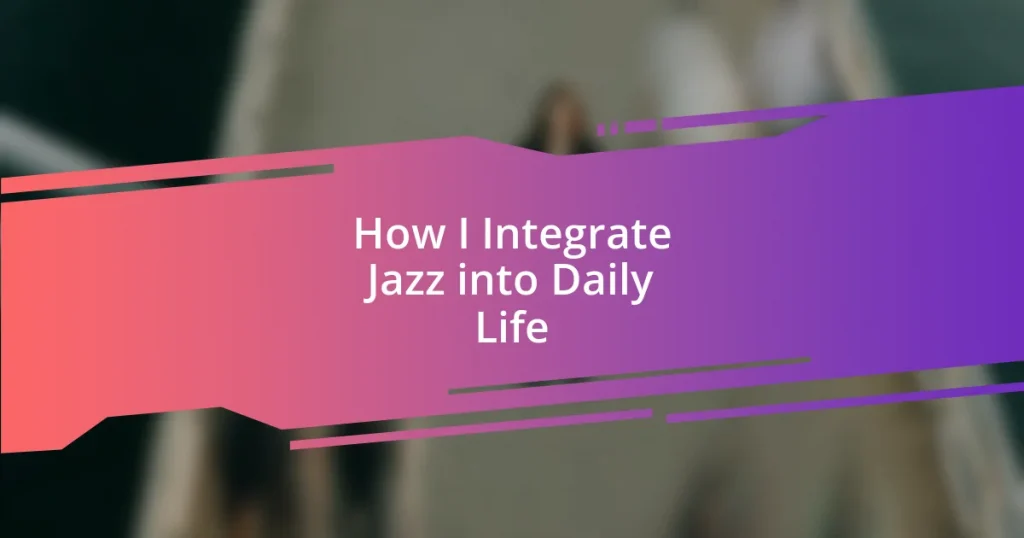Key takeaways:
- Emerging jazz talent is characterized by their unique sound, emotional connection, and willingness to experiment, making them vital to the genre’s evolution.
- Providing mentorship and organizing performance opportunities are crucial for developing artists, enhancing their technical skills, confidence, and connections within the industry.
- Online platforms play a significant role in promoting jazz, allowing artists to reach wider audiences, engage with fans in real-time, and share educational content that fosters community growth.
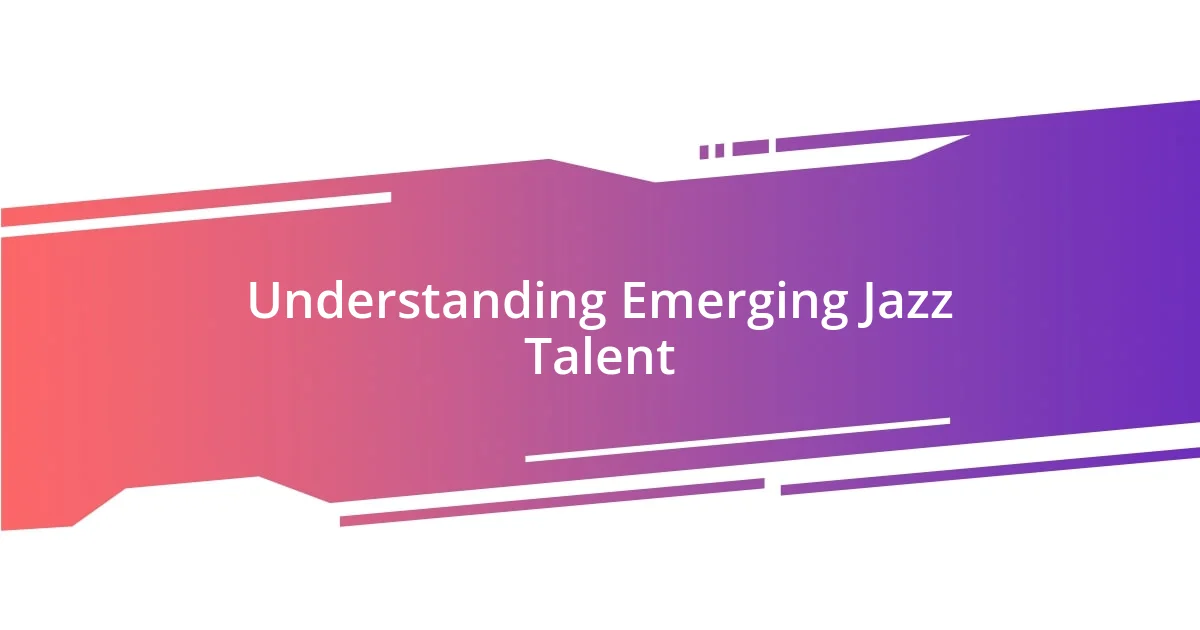
Understanding Emerging Jazz Talent
Emerging jazz talent often reflects the vibrant tapestry of contemporary society. I remember attending a small gig where a young saxophonist poured his heart into every note, revealing a raw honesty that connected deeply with the audience. It made me wonder how many untold stories and unique perspectives are waiting to be discovered in the world of budding musicians.
What fascinates me most about these artists is their willingness to experiment and push boundaries. The first time I heard a drummer seamlessly blend traditional jazz with electronic elements, I was taken aback. How can one genre evolve so dramatically? This is the beauty of emerging talent—they challenge our perceptions and expectations.
As I’ve interacted with younger musicians, I’ve noticed their tenacity and drive is palpable. Many of them face significant hurdles, yet they persist, motivated by a deep passion for the art form. It’s an emotional journey that resonates with anyone who’s ever pursued a dream against the odds, sparking a critical question: how can we best support these rising stars to ensure their voices are heard?
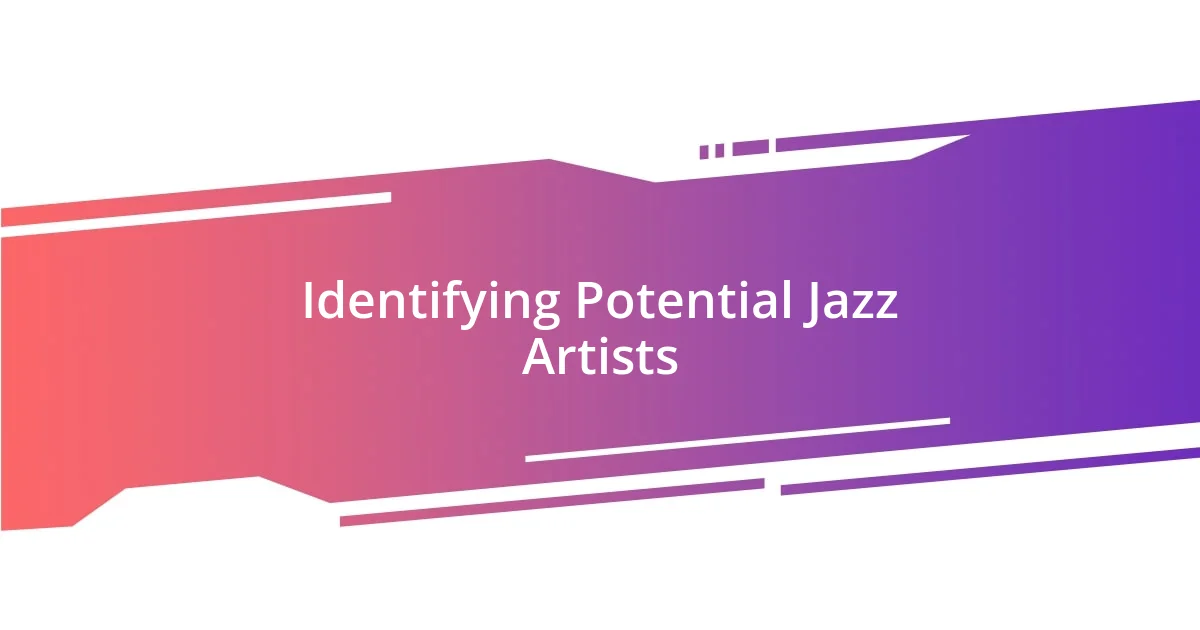
Identifying Potential Jazz Artists
When I’m out listening to live music, I focus on the subtle nuances that set a promising jazz artist apart from the rest. It’s those electrifying moments when a musician takes a bold risk or improvise a solo that captivates me. For me, identifying potential talent involves tuning into their emotional authenticity and the way they engage with their instrument and the audience.
Here are some key indicators I look for when spotting emerging jazz artists:
- Unique Sound: Does the musician have a distinct voice or style that sets them apart?
- Improvisational Skills: Are they comfortable taking risks and exploring new musical ideas?
- Emotional Connection: Can they convey genuine emotions through their performance?
- Stage Presence: Do they engage with the audience, drawing them into the experience?
- Influence of Diverse Genres: Are they incorporating elements from other genres, enriching their jazz interpretation?
Attention to these elements can illuminate a musician’s potential and reveal the depth of their artistry.
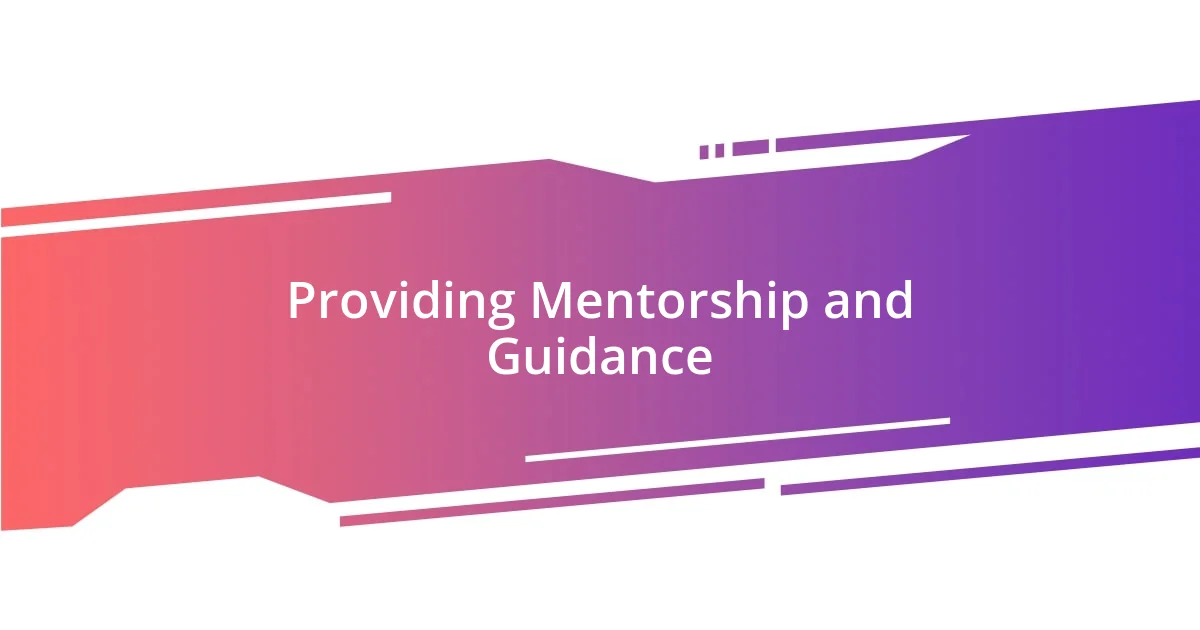
Providing Mentorship and Guidance
Providing mentorship and guidance to emerging jazz talent is one of the most rewarding experiences I’ve had in my musical journey. I recall a workshop I held where I guided a young vocalist through the intricacies of phrasing and timing. The moment she felt the rhythm, her eyes lit up with understanding, and it struck me how vital personalized guidance can be. Every artist benefits from having someone who believes in their potential and offers constructive feedback.
I often find that mentorship isn’t just about technical advice; it’s also about emotional support. I once worked with a guitarist who was struggling with performance anxiety. I shared my own experiences of feeling overwhelmed before a gig, and by simply normalizing his feelings, I could see him gradually relax and enjoy the process. It’s these personal connections that can transform a young musician’s trajectory, helping them gain confidence in their craft.
Moreover, creating a safe space for experimentation is essential. I like to encourage emerging artists to explore styles beyond traditional jazz, as this can cultivate their unique voice. A memorable moment came when I introduced a talented pianist to world music influences, which led her to compose a breathtaking fusion piece that celebrated her cultural roots. This exploration not only builds their skills but also deepens their artistic identity, broadening the jazz landscape in the process.
| Mentorship Focus | Impact on Emerging Artists |
|---|---|
| Technical Skills Development | Improvement in musicianship and performance quality. |
| Emotional Support | Increased confidence and reduced anxiety during performances. |
| Encouragement of Experimentation | Fostering creativity and unique artistic expressions. |
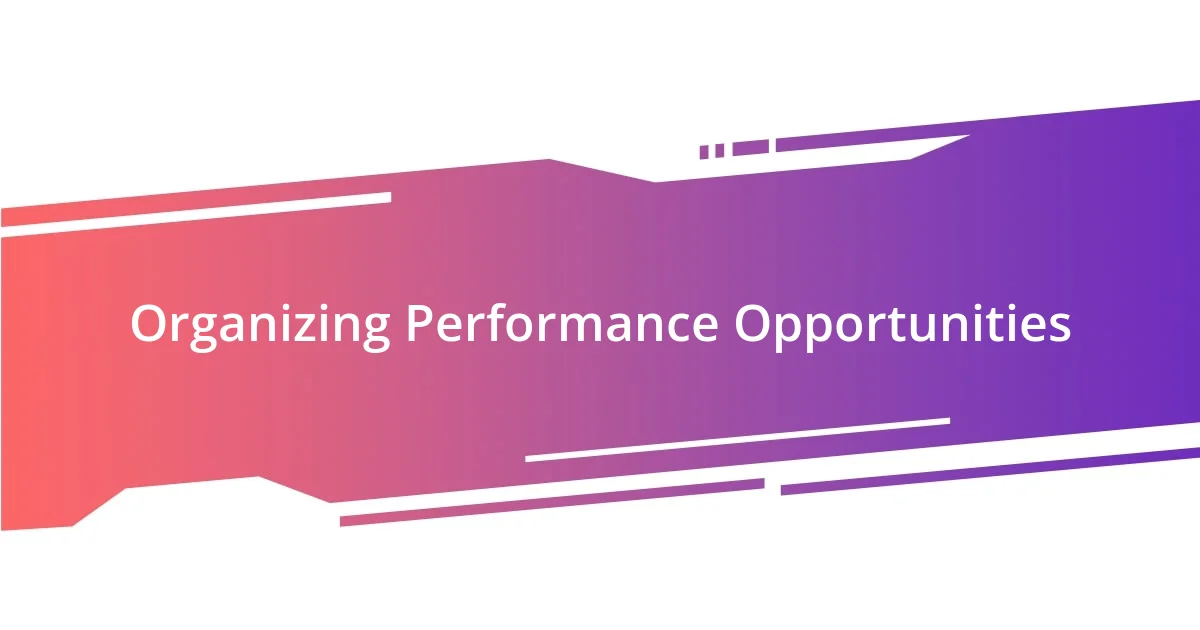
Organizing Performance Opportunities
Organizing performance opportunities for emerging jazz talent can be a game changer in their artistic journey. I remember arranging a community showcase for local musicians and feeling the palpable excitement in the air. Watching these artists take the stage for the first time reinforced my belief that having a platform to perform is crucial for their growth. What better way to test their skills and boost their confidence?
It’s essential to create diverse performance settings, ranging from intimate cafes to larger festivals. I organized a jazz night at a small venue that encouraged improvisation and audience interaction. The energy was electric! Musicians fed off each other’s creativity, and it was thrilling to see them push their boundaries in real time. Each gig served as both a learning experience and a stepping stone toward greater opportunities.
Equally important is fostering connections with seasoned professionals who can provide exposure. I made it a point to invite established jazz artists to my events, allowing rising talents to share the stage with them. Seeing a younger musician watch in awe as their idol performed gave me a rush. It’s inspiring for them to share that experience, and the industry connections made through these events can open doors in unpredictable and exciting ways. How amazing is it that a single performance opportunity can ignite a whole career?
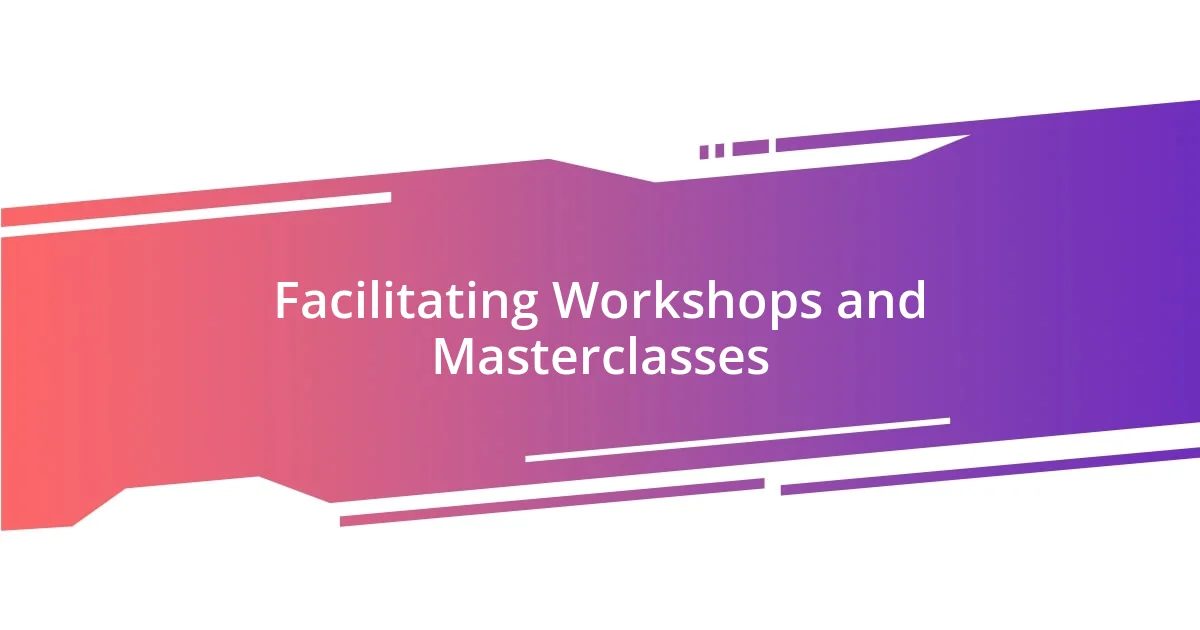
Facilitating Workshops and Masterclasses
Facilitating workshops and masterclasses provides a unique platform for emerging talent to hone their skills. I vividly recall a masterclass I conducted where musicians were encouraged to bring their own compositions. One participant shared a piece that was deeply personal to him; watching the evolution of his performance after just a few constructive suggestions was incredibly fulfilling. It’s fascinating how the right guidance can ignite a spark that propels their creativity to new heights, wouldn’t you agree?
Collaboration during these sessions also fosters a sense of community among participants. I once organized a workshop where attendees were divided into small groups to create improvised pieces together. The initial hesitation quickly transformed into enthusiastic exchanges of ideas and melodies. I could almost feel the room buzzing with energy as they started to blend their styles and experiment with different genres. These experiences reinforce the notion that jazz is not just an individual pursuit but a collaborative art form that thrives on interaction.
Ultimately, the impact of these workshops extends far beyond technical skill-building. The emotional growth I’ve witnessed is often just as profound. I remember a young saxophonist who entered my class feeling rather insecure about his abilities. By the end of our session, not only had he improved his technique, but he also took a brave step up to share his original improvisation with the group. The look of pride on his face was priceless, reminding me how workshops can nurture not just musicians but also confident artists. How wonderful it is to be part of their journey!
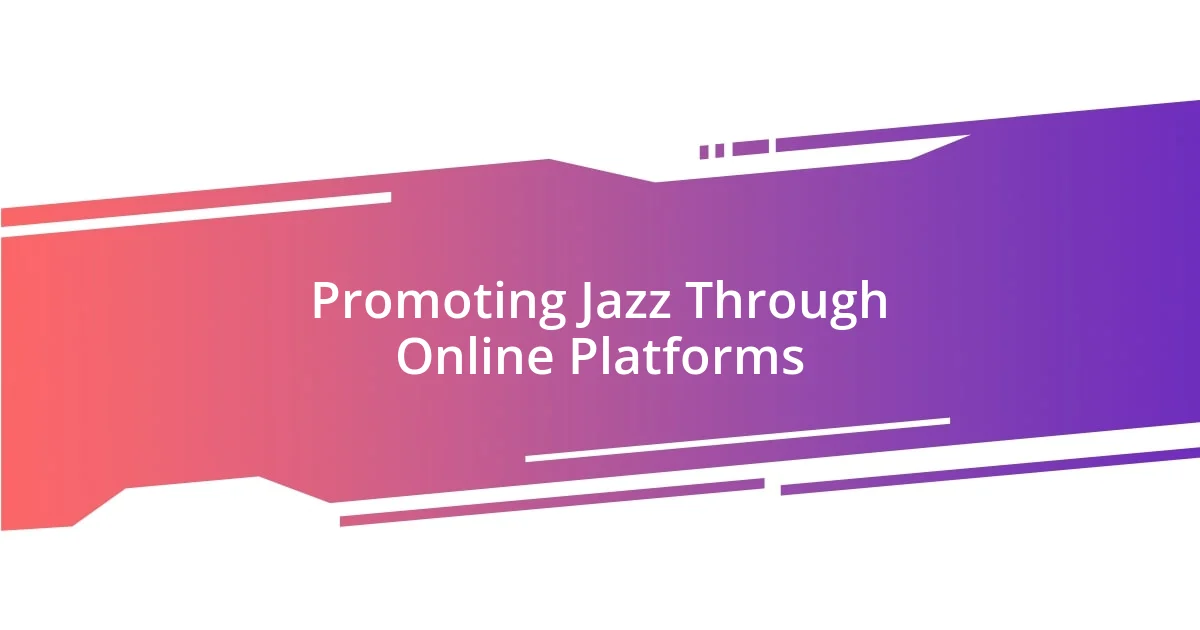
Promoting Jazz Through Online Platforms
Jazz has found a vibrant space online, and I’ve seen firsthand how these platforms can amplify emerging talent. Recently, I shared a short video of a young bassist performing an original piece on my social media page, and the response was overwhelming. The comments section turned into a mini community, with admirers praising her creativity and even offering to collaborate. It made me realize how valuable the online world is for musicians looking to find their audience and connect with fellow artists—who doesn’t love a little encouragement from strangers, right?
I’ve also experimented with online concerts, which opened up a whole new avenue for promoting talent. One memorable event featured a live-streamed performance with a group of local jazz musicians. As they played, viewers from different parts of the world tuned in, chatting and sharing their thoughts in real-time. It was electrifying to watch the artists interact with their audience, responding to comments and even taking requests! I believe this kind of direct engagement not only broadens their listener base but also creates a unique intimacy that traditional venues may lack.
Additionally, online platforms allow for the sharing of not just performances, but also educational content. I’ve taken to posting tutorial videos and jazz theory discussions, creating a space where musicians can learn and grow together. One session focused on improvisation techniques that I found particularly impactful. The community engagement around it was incredible—people commented with their own tips, creating a rich tapestry of shared knowledge. It’s moments like these that remind me that the digital age can be a powerful force for connection and growth within the jazz community. Isn’t it exciting to think about how technology can shape the future of music?
